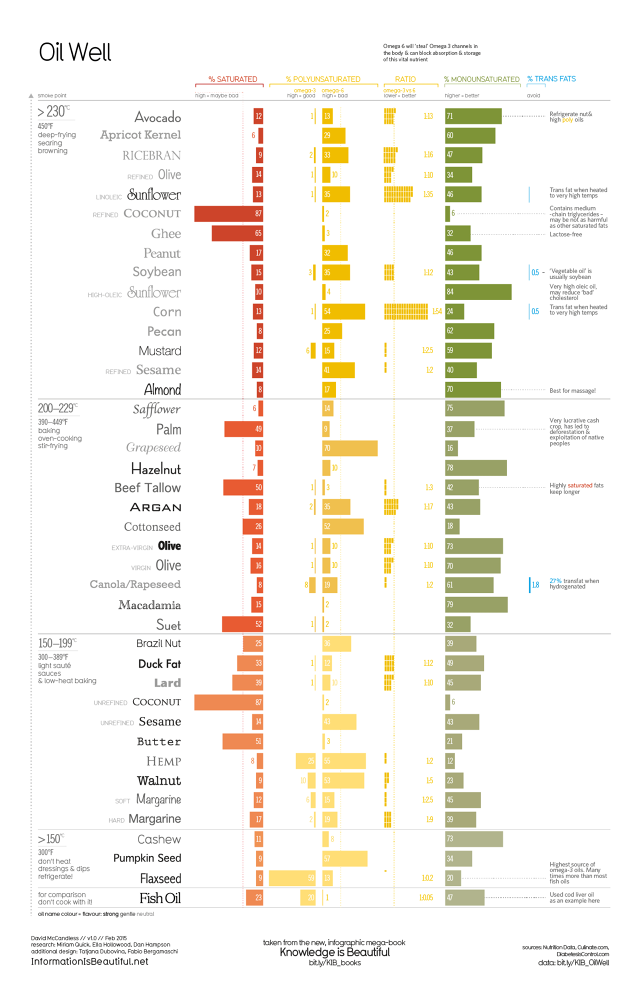This Infographic Shows Why You Shouldn't Cook With Coconut Oil
NOW THAT THE FDA HAS BANNED TRANS FATS, WHAT OILS SHOULD YOU COOK WITH? HOW ABOUT HIGH-OLEIC SUNFLOWER OIL?
The FDA recently made history by ordering food manufacturers toremove trans fats from products over the next three years . This is great news as the fats have long been linked to heart disease, obesity, and even memory loss.
But what oil should you actually be consuming and/or cooking with? A chart from data viz guru and Knowledge Is Beautiful author David McCandless gives us a run down of the potential risks and benefits ofnearly every cooking oil.

McCandless's infographic orders the oils from high to low according to their smoke points—the temperature at which the oil starts to break down and blue smoke emerges. The smoke point also tells you what the oils can be used for: those at the top, like avocado, refined coconut oil and the Indian butter ghee, can be used to deep fry or brown foods, as they can be heated up to around 450° Fahrenheit. Down at the bottom end, substances like cashew and pumpkin seed oil, used for dressings and dips, need to be kept refrigerated.
The chart lists the percent of saturated, polyunsaturated, monounsaturated and trans fats for each oil. Polyunsaturated fats are broken into omega-3 and omega-6 fatty acids with an attached note explaining that 3s are good and 6s are bad (omega-6s tend to block the storage of vital omega-3s). Therefore, the higher the ratio of omega-3s to omega-6s, the healthier the oil.
The chart also comes with other handy tips: for example, there's a disclaimer that the science is still out on whether saturated fats are harmful. Other helpful contextual notes teach us that most "vegetable oil" is actually made of soybeans, and that palm oil has led to deforestation and exploitation of indigenous workers. With his chart, McCandless provides us with a chance to make an informed decision about what we put in our bodies. Turns out avoiding trans fats was just the beginning.
[Top Photo: MidoSemsem via Shutterstock]
ADD NEW COMMENT
- I cant believe this bull*t myth still lives. Why are saturated fat bad? What is the evidence? It's an ideologically motivated conclusion - subsequently "proved" by meta studies, a type of "science" that is made for producing wanted conclusions... "This bla-bla shows you bla-bla".. No, it doesn't show damn st.It is a very visually appealing chart though, however the colors should be switched. ;)
- Creator should add cost as well. An important question is whether there are good-value nutritious fats.
- That's why you should cook with it!It has a very high smoking point, so isn't denatured at a high heat.And even though it's high in saturated fat, it's predominantly medium chain triglycerides which are easily digested and readily used for energy, unlike most other saturated fats.The saturated fat myth has also been well and truly debunked providing you have a balance of poly and mono unsaturated fats.See:Jack
3 COMMENTS